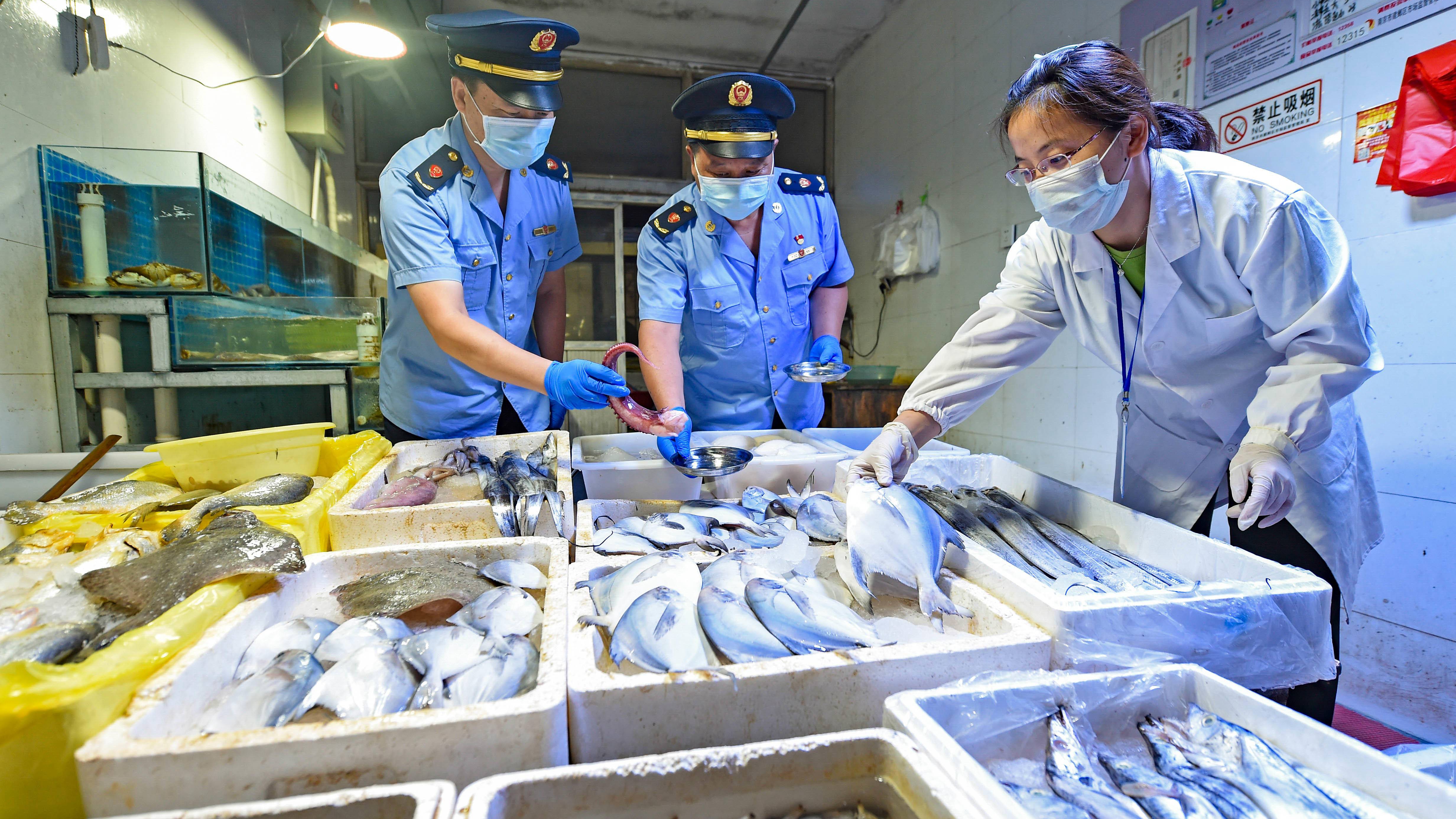
Food quarantine staff are testing seafood for the novel coronavirus at a store in east China's Nanjing, Jiangsu Province, June 16, 2020. /VCG
Food quarantine staff are testing seafood for the novel coronavirus at a store in east China's Nanjing, Jiangsu Province, June 16, 2020. /VCG
Recent novel coronavirus clusters reported in Beijing's Xinfadi wholesale market and Germany's meat processing firm Toennies seem to point to a new concern: cold chain food storage and transport could be a new hotbed for the novel coronavirus.
Fresh data analysis of gene sequencing has shown that the virus strain that has caused Beijing's latest outbreak at Xinfadi market has European origins, but is older than the strain currently circulating in the continent.
Read more:
China releases gene sequence data of Beijing COVID-19 strain
WHO: Coronavirus from new Beijing cluster closely related to the European strain
This has triggered speculation that the virus might have come with imported frozen food and has been lurking somewhere along the supply chain for a couple of months before being exposed to market staff.
Zhang Yong, assistant director of the Institute of Viral Diseases at the Chinese Center for Disease Control and Prevention (Chinese CDC), said it's possible that the virus did not mutate during transport as it had been sealed in frozen food and stored in cold and damp conditions. That could be the reason why the strain found in Beijing is much closer to the original virus found in Europe months ago.
Germany has also seen repeated outbreaks in slaughterhouses, where meat is stored and transported at low temperatures. Against this backdrop, there is growing concern that the virus could be transmitted through cold chain.
However, there is no evidence so far that temperature-controlled supply chain is the direct cause of the new clusters. After all, such places as wholesale markets and slaughterhouses all have a constant flow of people on a daily basis, which means the virus could easily spread among the crowd.
Low temperature favorable for virus survival
Li Lanjuan, a Chinese epidemiologist, said on Friday that viruses in general can survive quite a long time in cold chain. Some known viruses can even live as long as 20 years when the environment temperature is below -20℃. Yet the novel coronavirus is a new virus and how long it can survive in cold environment remains to be studied, she noted.
Still, she suggested that the customs should strengthen inspection and test of food transported via cold chain, and trace the source of materials that test positive for the novel coronavirus.
China's customs authorities have already taken such action. At a press briefing on Friday, Song Yueqian, deputy director general of the Department of Health Quarantine of China's General Administration of Customs (GACC), said that customs nationwide have conducted sample tests for imported food products transported via cold chain from high risk countries and regions, with all results negative.

Li Lanjuan, a top Chinese epidemiologist, speaks at a seminar on COVID-19 prevention and control in east China's Hangzhou City, Zhejiang Province, June 19, 2020. /VCG
Li Lanjuan, a top Chinese epidemiologist, speaks at a seminar on COVID-19 prevention and control in east China's Hangzhou City, Zhejiang Province, June 19, 2020. /VCG
Special attention to food safety
At a press briefing on COVID-19 on Saturday, Li Fengqin, director of the Microbiology Laboratory of China's National Food Safety Risk Assessment Center, said there has been no evidence that people could contract coronavirus through eating certain foods, citing the World Health Organization (WHO).
However, she warned that food surface or package could be contaminated by the virus. Even though the virus cannot reproduce on food surface, it can live for a long time in low temperatures.
"At present, the possibility cannot be ruled out that frozen food and packages could carry the virus, contaminating a larger environment and then infecting people," she said.
Food inspection and quarantine are especially important at the moment, she pointed out. In order to prevent contaminated food from entering the supply chain, it's necessary to strengthen supervision at all links. Consumers should also improve self-protection awareness when dealing with raw food.